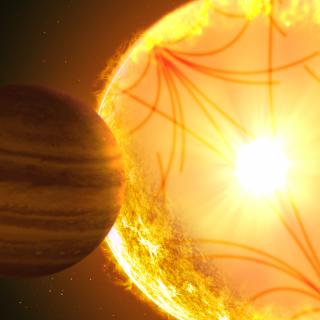Bibcode
Van Cleve, J.; Thompson, S. E.; Kjeldsen, H.; Still, M.; Van Saders, J. L.; Stello, D.; Molenda-Żakowicz, J.; García, R. A.; Christensen-Dalsgaard, J.; Chaplin, W. J.; Niemczura, E.; Bedding, T. R.; Bruntt, H.; Biazzo, K.; Thygesen, A. O.; Handberg, R.; Campante, T. L.; Brandão, I. M.; Sousa, S. G.; Mathur, S.; Karoff, C.; Frasca, A.; Pinsonneault, M.; Monteiro, M. J. P. F. G.; Creevey, O. L.; Eggenberger, P.; Di Mauro, M. P.; Deheuvels, S.; Metcalfe, T. S.; Doğan, G.
Referencia bibliográfica
The Astrophysical Journal, Volume 763, Issue 1, article id. 49, 10 pp. (2013).
Fecha de publicación:
1
2013
Revista
Número de citas
27
Número de citas referidas
20
Descripción
Determining fundamental properties of stars through stellar modeling has
improved substantially due to recent advances in asteroseismology.
Thanks to the unprecedented data quality obtained by space missions,
particularly CoRoT and Kepler, invaluable information is extracted from
the high-precision stellar oscillation frequencies, which provide very
strong constraints on possible stellar models for a given set of
classical observations. In this work, we have characterized two
relatively faint stars, KIC 10920273 and KIC 11395018, using oscillation
data from Kepler photometry and atmospheric constraints from
ground-based spectroscopy. Both stars have very similar atmospheric
properties; however, using the individual frequencies extracted from the
Kepler data, we have determined quite distinct global properties, with
increased precision compared to that of earlier results. We found that
both stars have left the main sequence and characterized them as
follows: KIC 10920273 is a one-solar-mass star (M = 1.00 ± 0.04 M
☉), but much older than our Sun (t = 7.12 ± 0.47
Gyr), while KIC 11395018 is significantly more massive than the Sun (M =
1.27 ± 0.04 M ☉) with an age close to that of
the Sun (t = 4.57 ± 0.23 Gyr). We confirm that the high lithium
abundance reported for these stars should not be considered to represent
young ages, as we precisely determined them to be evolved subgiants. We
discuss the use of surface lithium abundance, rotation, and activity
relations as potential age diagnostics.
Proyectos relacionados

Sismología Solar y Estelar y Búsqueda de Exoplanetas
Los objetivos genéricos de este Proyecto son: 1) el estudio de la estructura y dinámica del interior solar, 2) la extensión de dicho estudio al caso de otras estrellas, 3) la búsqueda y caracterización de planetas extrasolares por métodos fotométricos (principalmente mediante el método de tránsitos) y espectroscópico (variaciones en la velocidad
Savita
Mathur